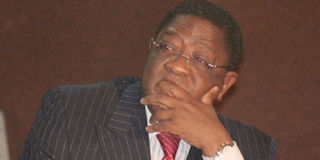Wako: No mercy for poll violence leaders

Attorney General Amos Wako at the Waki Commission on Monday. Photo/PHOEBE OKALL
What you need to know:
- Wako says none of those who participated in post-election violence should benefit from amnesty.
- He said Government had set aside Sh20 million for the Witness Protection Programme.
- Calling for criminal justice system overhaul, Wako said the country lacked capacity to investigate various crimes
- AG also recommended security of tenure for the Police Commissioner and the Director of Public Prosecution
Politicians responsible for organising the post-election violence should be barred from public office; and none of those who participated in the mayhem should benefit from amnesty.
That was the message from Attorney-General Amos Wako when he appeared before the Commission of Inquiry into Post-Election Violence.
“It is the view of the Attorney-General that all cases where there is evidence must be prosecuted and where no sufficient evidence can be gathered, then such cases should be terminated,” Mr Wako told the Inquiry chaired by Justice Philip Waki.
Stand-off
The AG also described as illegal a government ban on live television and radio broadcasts on December 30 during the tense stand-off when the presidential election results were delayed.
There has been public differences between the PNU and ODM arms of the grand coalition government over how to deal with those arrested over the violence. ODM, which is led by Prime Minister Raila Odinga, has been urging freedom and amnesty for those arrested, but Justice, National Cohesion and Constitutional Affairs minister Martha Karua has been insisting the law should take its course.
Mr Wako regretted the inability to arrest and prosecute those involved in the violence, recommending an overhaul to make the investigative and prosecution arms more effective.
“I wish I had the power not only to control, but also to direct investigations,” Mr Wako said. He noted that the will to prosecute existed, but added that investigations, especially those related to post-election violence, faced major challenges.
He said that police investigators were susceptible to manipulation, but was quick to add that the Criminal Investigations Department had the capacity to carry out investigations. He, however, said that the department must be insulated from interference and manipulation.
Mr Wako said that investigators had difficulties tracing witnesses because of displacement that affected over 350,000 people and that some were unwilling to come forward for fear of reprisals.
Witness protection
He said that Government had set aside Sh20 million for the Witness Protection Programme.
He also said Parliament threw out laws that were intended to curb the kind of violence witnessed. The AG told the Inquiry that the National Security Intelligence Services had advised that laws relating to hate speech be strengthened, but after his office had prepared the amendments, they were shot down in Parliament.
Calling for an overhaul of the criminal justice system, Mr Wako said the country lacked the capacity to investigate various criminal acts and urged the establishment of directorate of criminal investigation through an Act of Parliament to be placed under the AG’s office, The CID is presently a department of the Police Force.
The AG also recommended security of tenure for the Police Commissioner and the Director of Public Prosecution as means of granting investigators independence. Asked by Justice Waki whether the police could investigate themselves, Mr Wako was noncommittal.
Justice Waki: “And you think that police will investigate themselves?”
Mr Wako: “Your guess is as good as mine.”
Later, Electoral Commission chairman Samuel Kivuitu told the Inquiry that the ECK lacks the means to enforce the Electoral Code of Conduct.
Mr Kivuitu said it was parliament that has failed to make the necessary amendments to the law to empower the ECK, which had thus not been able to deal with errant politicians and political parties.
He however told Judge Waki that he would not recommend that the ECK has its own police force. He also told the inquiry that the ECK was well prepared to conduct the election but noted that there was need to relay election results faster, especially in a close election like the one experienced last year.




